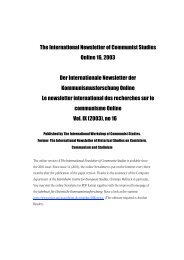VOL. XVI (2010), NO 23 - The International Newsletter of Communist ...
VOL. XVI (2010), NO 23 - The International Newsletter of Communist ...
VOL. XVI (2010), NO 23 - The International Newsletter of Communist ...
Sie wollen auch ein ePaper? Erhöhen Sie die Reichweite Ihrer Titel.
YUMPU macht aus Druck-PDFs automatisch weboptimierte ePaper, die Google liebt.
<strong>The</strong> <strong>International</strong> <strong>Newsletter</strong> <strong>of</strong> <strong>Communist</strong> Studies Online <strong>XVI</strong> (<strong>2010</strong>), no. <strong>23</strong> 172<br />
Reports and Calls for Papers<br />
<strong>International</strong> Conference on Alexander Radó in Budapest.<br />
On the occasion <strong>of</strong> the 110th anniversary <strong>of</strong> birth <strong>of</strong> Sándor (Alexander) Radó, reknown<br />
Hungarian geographer-cartographer and famous Russian spy, a two days international<br />
conference was held in Budapest, on the 4th and 5th <strong>of</strong> November 2009. <strong>The</strong> initiator <strong>of</strong> the<br />
conference was Radó’s stepson, András Trom, Hungarian journalist, and the organizer was<br />
the MoD Institute and Museum <strong>of</strong> Military History <strong>of</strong> Hungary. This was the very first<br />
conference dedicated to examining and evaluating the role <strong>of</strong> Sándor Radó in military<br />
intelligence during the WWII and his contribution in developing the post-war geography <strong>of</strong><br />
Hungary to the level <strong>of</strong> an internationally acknowledge cooperation partner.<br />
Radó’s memoirs were published in Hungarian in 1971 and, afterwards, in 21 languages. <strong>The</strong><br />
first uncensored, complete edition was published by Andras Trom in 2006. During the<br />
conference lots <strong>of</strong> details were disclosed about Radó’s hidden life by András Trom. German<br />
historian Bernd-Rainer Barth gave comprehensive information about the main figures <strong>of</strong><br />
Radó’s Swiss GRU intelligence group and about the circumstances <strong>of</strong> the writing <strong>of</strong> Radó’s<br />
memoirs. Barth gave assessment <strong>of</strong> the clue <strong>of</strong> Radó’s arrest and reason <strong>of</strong> his inprisonment<br />
in the Gulag. German historian Rainer Karlsch gave some important hints about the<br />
contribution <strong>of</strong> the Radó group to the nuclear intelligence and its influence to the the<br />
development <strong>of</strong> the Soviet nuclear bomb. In the paper <strong>of</strong> Russian historian Sergei Poltorak,<br />
some evidences were disclosed about the conflicts between GRU and SMERSh which led to<br />
the arrest <strong>of</strong> several leading Russian spies. French historian Guillaume Bourgeois focused<br />
on Radó’s attempt to escape in Cairo in 1945 and the destiny <strong>of</strong> his wife and co-fighter<br />
Helene Jansen, who lived in France between 1945 and 1955. <strong>The</strong> Hungarian lecturers<br />
presented Radó’s pre- and post-war geographic and cartographic activity. <strong>The</strong>y evaluated<br />
Radó’s contribution to the free flow <strong>of</strong> international geographic information and his role as<br />
that <strong>of</strong> a forerunner <strong>of</strong> globalization. During the conference a memorial tablet dedicated to<br />
Radó was inaugurated in the garden <strong>of</strong> the Museum.<br />
(Bernd-Rainer Barth, Berlin)<br />
Konferenz: Krieg und Frieden. 100 Jahre Ausserordentlicher Kongress der<br />
Sozialistischen <strong>International</strong>e „Gegen den Krieg“ von 1912 in Basel und die Frage des<br />
Friedens heute.<br />
Call for Papers – Basel, <strong>23</strong>./24. November 2012<br />
Das Problem eines aufkommenden Krieges wurde ab 1905 das beherrschende <strong>The</strong>ma in<br />
der Sozialistischen <strong>International</strong>e. Zwar hatte man das Problem des Krieges und seiner<br />
Verhinderung schon seit der Gründung in unterschiedlichen Resolutionen vermerkt, dieses<br />
<strong>The</strong>ma wurde aber auf den Kongressen eher am Rande, wenn überhaupt, behandelt.<br />
Im November 1912 fand in Basel der „Ausserordentliche <strong>International</strong>e Sozialistenkongress“<br />
oder „Friedenskongress der Sozialistischen <strong>International</strong>e“ statt. Nicht nur die große Zahl der<br />
555 Delegierten aus <strong>23</strong> Ländern war beeindruckend, sondern auch die Resonanz des<br />
Friedensmarsches durch das Zentrum der Stadt Basel sowie die Ansprachen von Jean














